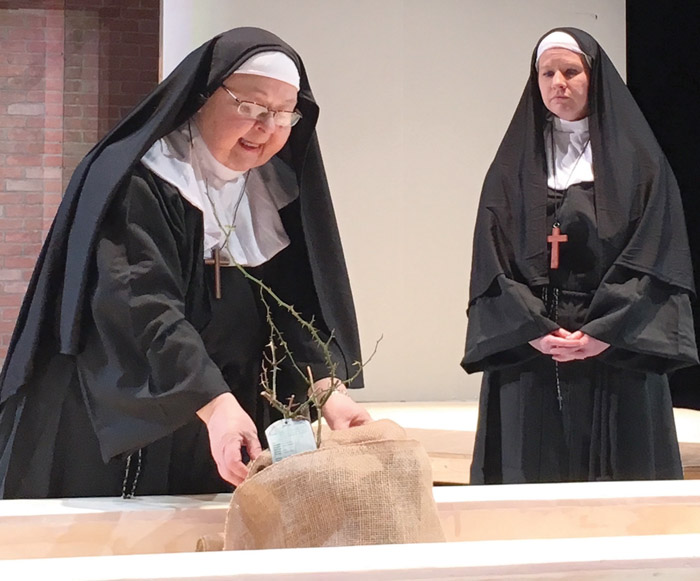When there is doubt, can there be justice?
Published 12:00 am Saturday, January 20, 2018

- Submitted photo Becky Lippard, left, as Sister Aloysius, and Emma Rose as Sister James in the St. Thomas Players production of 'Doubt,' at Lee Street theatre.
By Deirdre Parker Smith
deirdre.smith@salisburypost.com
Where there is doubt, is there innocence or guilt?
That’s the question in the St. Thomas Players’ production of “Doubt: A Parable,” which opened Friday night at Lee Street theatre.
Maybe after you hear the arguments on both sides, you will have the certainty of Sister Aloysius, the school principal, played with stern, somber conviction by Becky Lippard.
Or you may be unconvinced, as is sweet Sister James, played by Emma Rose.
You have only the word of the suspicious Sister Aloysius and the accused Father Flynn, played with the right touch of, well, doubt, by Bill Reilly.
This 90-minute drama poses many questions, but the one that drives the plot is Sister Aloysius’ suspicions that Father Flynn has behaved inappropriately with one of the school’s students, Donald Muller.
Muller, whom we never see or hear, also happens to be the only “colored” — it’s 1964 — at the Catholic school, so he faces an uphill battle, anyway. When we learn later that his father beats him and his mother wants no part of any accusation, that complicates matters even further.
Playwright John Patrick Shanley sets up the audience with a predisposition to dislike strict Sister Aloysius. In an early scene, she is correcting — or is that berating — young Sister James about her teaching style. She’s too kind, too familiar; she gets too excited about history; she doesn’t watch her students closely enough. She’s about love and a sense of family and a joy of learning. That’s not the job of a teacher, Sister Aloysius says. The job is to teach, to be firm, to curb enthusiasm. Students are not family. And they’re too young to have an opinion or a feeling.
Sister Aloysius goes so far as to decry the use of ballpoint pens, saying the only proper penmanship is with fountain pens. She disapproves, as well, of people putting sugar in their tea — particularly Father Flynn, who uses three cubes. And his fingernails are too long.
Sister James feels she is failing, and she doesn’t know how to fix the things her superior sees as flaws without losing her joy for teaching. Rose portrays the young nun’s discomfort and reluctance to be part of something for which she has no evidence.
When an upset Donald Muller is taken to the rectory for a talk with Father Flynn, Sister Aloysius is absolutely positive something unseemly has occurred. She questions Sister James, who says Donald was acting different — somehow — and had a smell of alcohol on his breath.
In the hierarchy of the church, certainly in 1964, there was a strict chain of authority, and nuns had none over priests. Sister Aloysius could present her suspicions to the monsignor in residence, a doddering old man, but she cannot go beyond that; she doesn’t have that power.
Lippard projects her doubt about Father Flynn with her eyes. It’s obvious she does not believe anything he tells her, nor his protestations that nothing happened. When he proclaims the right of a priest not to reveal his interactions with another person, she is further assured of wrongdoing. Reilly shows Flynn’s frustrations and fear well.
But when she brings the boy’s mother in to tell her of the likely wrongdoing, Mrs. Muller doesn’t want to hear it. She can’t understand why the nun wants to punish her boy for something a man did wrong. The conversation takes a surprising turn, which strengthens the nun’s conviction of Flynn’s guilt. Lillie Oden does the perfect job as a mother who just wants her son to survive.
Another confrontation follows, accusations flying, and Flynn realizes Sister Aloysius will believe nothing he says, that she will do anything to get rid of him, even if it means the end of her own vocation.
As the doubts fly and the story advances, the final scene raises the most devastating question of all.
This cast has faced numerous challenges, mainly due to the weather, and this is a play with lots of talk. They hold on to their characters and pull the audience in almost immediately.
This is not a play for children. It is serious and topical and something that should be discussed. Is it a witch hunt? Is it a moral breakdown? What just happened?
Director Claudia Galup tackles this very tough subject with a subtle hand. She lets the story and the actors present the problem. It’s up to the audience to determine the outcome.
“Doubt: A Parable” continues at 7:30 tonight and Jan. 25-27., with a 2:30 matinee Sunday. For tickets, call 704-310-5507 or visit www.leestreet.org





